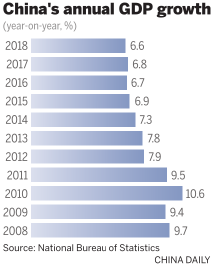Growth rebound likely via policies, experts say


China's economy grew 6.6 percent year-on-year last year, down from 6.8 percent in 2017, the National Bureau of Statistics said on Monday.
Despite the easing of growth, economists said that as China's supportive policies take effect, growth is expected to stabilize and recover as early as the first quarter of the year.
The country's GDP for its first time exceeded 90 trillion yuan ($13.28 trillion) last year.
Growth in the fourth quarter of last year was 6.4 percent, compared with 6.7 percent in the first three quarters, said Ning Jizhe, head of the NBS, at a news conference on Monday. "Overall, the economy performed within a reasonable range in 2018" after it exceeded the preset growth target of about 6.5 percent."
John Litwack, the World Bank's lead economist for China, said, "GDP growth in 2018 was broadly in line with our expectations since the beginning of the year."
Liu Chunsheng, an associate professor of economics at Central University of Finance and Economics in Beijing, said the growth of the Chinese economy edged down in 2018 partly due to domestic moves to cut debt and uncertainties created by trade disputes with the United States.
"Deleveraging moves and other restructuring policies, although necessary for long-term economic development, have led to short-term pain as they accelerated the knocking out of weaker players in the market."
However, economic structure upgrading, which is reflected by the rising contribution of services and consumption, in tandem with strong domestic consumption and sound performance in trade and foreign investment inflow, has supported the economy in achieving growth that is rather outstanding in the context of the world economy, Liu said.
Economists remained confident that the Chinese economy will grow in a stable manner.
"We still expect good performance from China's economy this year, although the pace of growth should be a bit slower," Litwack said.
Cheng Shi, chief economist at ICBC International, said economic structural upgrading, which leads to higher production efficiency, is shoring up the economy, which could start to rebound in the first quarter.
China is rolling out proactive fiscal policy and supportive monetary policy, the effect of which will gradually unfold, Cheng said. "The Chinese economy is likely to stabilize and rebound in the first quarter of this year, beating market expectations."
The country's ongoing tax reductions could offer a major boost to the economy this year, economists said.
A report from Peking University's Guanghua Management School estimated the amount of cuts in taxes and fees could total 1.5 trillion yuan ($220.8 billion) to 2 trillion yuan this year, and a reduction in value-added tax and corporate income tax may come soon.
"To ensure sustainable economic development, China should give priority to revitalizing the private sector and small enterprises, as they are the most efficient contributor to employment and technological advances," said Yang Weiyong, an associate professor at the University of International Business and Economics in Beijing.
"Our primary advice is for China to stay focused on policies and reforms that can ensure strong growth over the medium and longer term. If some short-term growth needs to be sacrificed to accomplish this, it is well worth the cost," said Litwack. These policies and reforms include measures to control credit growth and implement budget reform, he said.





































